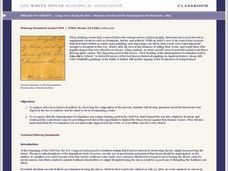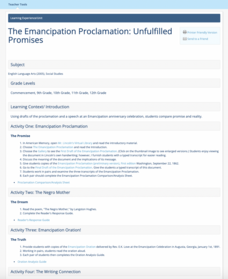Library of Virginia
Life as a Liberated People
Imagine having no control over your life and then suddenly having to provide for yourself. Such was the challenge faced by many American slaves after emancipation. Class members are asked to consider these challenges are they examine...
Curated OER
Emancipation Proclamation
Students examine the Emancipation Proclamation. In this Emancipation Proclamation instructional activity, students examine the document and respond to 6 questions regarding it.
Curated OER
Hoosier Soldiers and the Emancipation Proclamation
Eighth graders examine the impact of Lincoln's Emancipation Proclamation through the eyes of Indiana soldiers. In this American Civil War lesson plan, 8th graders read the proclamation and then students write essays that included letters...
Curated OER
Exploring the Eras of the Emancipation Proclamation and the Civil Rights Movement
Eighth graders utilize many sources (books, computer, magazines, etc...) to research the eras of the Emancipation Proclamation and Civil Rights Movement and create a T-Chart comparison.
Curated OER
Lincoln, the Great Emancipator?
Students examine the motivating factors that prompted Lincoln to draft the Emancipation Proclamation in 1863. They examine Lincoln's social and political beliefs, particularly as they pertained to slavery and race in the United States.
National Park Service
Freedom at Antietam
Explore how the issuance of the Emancipation Proclamation affected everyday individuals in the Civil War era. Learners are given the opportunity to read and evaluate primary and secondary source material, and then to compose a writing...
Curated OER
The age of majority: How old is old enough?
Young scholars research on the Web and in books the "age of majority" in general and how it applies in their particular states. Explore, too, "emancipation" and whether this is another way for teens to earn additional rights. Students...
Facing History and Ourselves
Defining Freedom
The Emancipation Proclamation freed slaves in the Confederate states. The Thirteenth Amendment banned slavery in the United States. However, neither document defined freedom. The second lesson in the Reconstruction Era series examines...
Middle Level Learning
Philip Reid and the Statue of Freedom
Approach the concept of freedom in United States history from a variety of angles and delve into rich primary source analysis practice. Pupils study the Statue of Freedom, which sits atop the dome of the Capitol building in Washington...
Curated OER
Using Art to Study the Past: Abraham Lincoln and the Emancipation Proclamation - 1863
Fifth graders analyze artwork as historical artifact and recognize that the Emancipation Proclamation was a major turning point in the Civil War.
Curated OER
The Emancipation Proclamation: Unfulfilled Promises
Young scholars perform research into the Emancipation Proclaimation. The document will aid learners in understanding the history and culture of the time of writing. Finally critical thinking skills are used to formulate contextual meaning.
Curated OER
Who Freed the Slaves During the Civil War?
Pose the question to your historians: who really freed the slaves? They critically assess various arguments, using primary sources as evidence. In small groups, scholars jigsaw 5 primary source documents (linked), and fill out an...
Curated OER
The American Civil War (1861 -1864)
Peek back in time and learn about the North and South of the American Civil War. Discussed in full are the causes, effects, major battles, and agreements that made Civil War history. Period technology, social changes, and the ultimate...
Core Knowledge Foundation
The Civil War
A unit covers many aspects of the Civil War. Over six weeks, fifth graders delve deep into the history of slavery, the Civil War—before, during, and after—Abraham Lincoln, women's contributions, the Emancipation Proclamation, and...
Core Knowledge Foundation
The U.S. Civil War Tell It Again!™ Read-Aloud Anthology
Over three weeks, second graders listen to stories about the United States Civil War. Informational texts explore the war, slavery, Harriet Tubman, Abraham Lincoln, Robert E. Lee, Clara Barton, the Emancipation Proclamation, and Ulysses...
Curated OER
A Slave No More
Students discover what it was like to cross into freedom. In this slavery lesson, students read the "Emancipation Proclamation," and letters written by Abraham Lincoln and John Washington (a former slave). Students identify the key ideas...
Curated OER
Breaking the Chains: Rising Out of Circumstances
Study history through photographs. In this visual arts and history lesson, students learn to analyze photographs to discover details about life during the Civil War era. Students write journal entries as if they are the African-American...
Curated OER
Civil War and Beyond
Sixth graders play a game. In this Civil War lesson, 6th graders discuss the beginnings of the Civil War and define vocabulary words associated with the war such as abolitionist and Emancipation Proclamation. Students play a game of...
Curated OER
Attitudes Toward Emancipation
Students evaluate the provisions of the Emancipation Proclamation. They trace the stages that led to Lincoln's formulation of this policy. Explore the range of contemporary public opinion on the issue of emancipation.
Chicago Historical Society
Are We the People?
Taking on the roles of a fiery Boston patriot, a Philadelphia merchant's wife, and a prominent abolitionist, your young historians will consider the reactions of these early Americans to the creation of the Declaration of Independence,...
Humanities Texas
Primary Source Worksheet: Frederick Douglass, “Expression of Gratitude for Freedom”
Here is a fantastic primary source analysis activity regarding Frederick Douglass' speech delivered at the unveiling of the Freedmen's Monument in 1876. The follow-up discussion questions and activities highlight Douglass' discussion of...
Curated OER
"In Defense of My Race and Country": African-American Soldiers on Why They Are Fighting
Why would an African-American slave fight in the Civil War? Read and analyze primary source documents to understand the ex-slave perspective on fighting in the Union Army. Everything to complete this lesson is included.
Curated OER
Breaking the Chains, Rising Out of Circumstances
Discuss the history of slavery by analyzing historic photography depicting slavery. Learners write fictional stories based on these photographs. This is a creative and motivating way to launch a discussion of these topics.
Curated OER
What This Cruel War Was Over: Slavery and the Civil War
Can't travel to Richmond for your Civil War unit? This plan creates an authentic experience, using primary sources and the essential question: Over What Was the Civil War Fought? Historians examine the Appomattox Marker, the site of Gen....

























